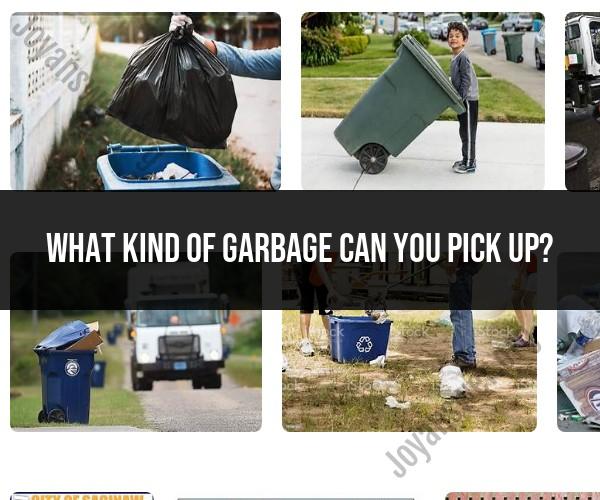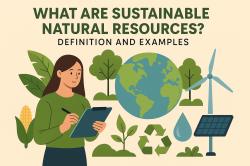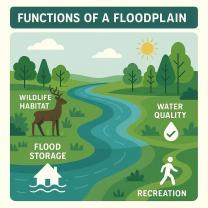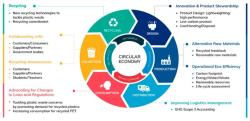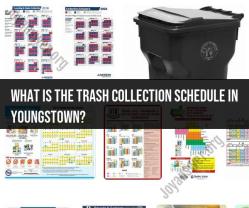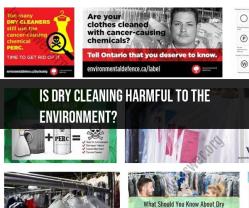What kind of Garbage can you pick up?
The types of garbage that can be picked up for disposal can vary depending on your location, local waste management regulations, and the policies of your waste collection service. Generally, garbage collection services are categorized into several types of waste, including:
Household Trash: This is the everyday waste generated from homes, such as food scraps, packaging materials, and non-recyclable items. It typically includes items that can't be recycled or composted.
Recyclables: These are materials that can be recycled and are collected separately from regular trash. Common recyclables include paper, cardboard, glass, plastic bottles, and aluminum cans. Some areas have single-stream recycling, where various recyclable materials are collected together.
Yard Waste: Yard waste includes organic materials like grass clippings, leaves, branches, and tree trimmings. In many places, yard waste is collected separately and may be composted or mulched.
Bulk Waste: Bulk waste includes large items that don't fit in standard trash cans, such as furniture, appliances, mattresses, and electronics. Many waste collection services offer special pickups or drop-off locations for bulk waste.
Hazardous Waste: Hazardous waste includes items that are potentially harmful to the environment or human health, such as paint, chemicals, batteries, and certain electronic devices. Hazardous waste should be disposed of through designated collection events or facilities.
Medical Waste: Medical waste includes items like syringes, used medical supplies, and some medications. Proper disposal of medical waste is essential to prevent contamination and ensure public safety. Medical facilities typically have specific procedures for medical waste disposal.
E-Waste (Electronic Waste): E-waste consists of old or non-functioning electronic devices, such as computers, televisions, and mobile phones. Some areas have e-waste recycling programs, while others may require special disposal methods.
Construction and Demolition Debris: This category includes waste generated from construction and demolition activities, such as concrete, wood, drywall, and roofing materials. Disposal of construction debris often requires specialized services or facilities.
Household Hazardous Waste (HHW): This is a subset of hazardous waste that includes household items like cleaning products, pesticides, and certain paints. Many communities have HHW collection events or permanent drop-off sites.
It's essential to check with your local waste management authorities or the waste collection service provider in your area to determine the specific types of garbage they accept and their guidelines for proper disposal. Different communities have different rules and regulations, so understanding what is allowed and how to dispose of various types of waste responsibly is important for environmental sustainability and public health.
Types of Garbage Accepted for Collection
The types of garbage that are accepted for collection vary depending on the municipality. However, most municipalities accept the following types of garbage:
- Household trash: This includes food waste, paper waste, plastic waste, and metal waste.
- Yard waste: This includes grass clippings, leaves, and branches.
- Bulk waste: This includes large items such as furniture, appliances, and mattresses.
- Hazardous waste: This includes items such as batteries, paint, and electronics.
What Can You Dispose of in Your Garbage Collection?
When disposing of garbage in your garbage collection, it is important to follow the guidelines set by your municipality. These guidelines will vary depending on the type of garbage you are disposing of.
For example, most municipalities require that hazardous waste be disposed of at a special collection site. Additionally, some municipalities require that yard waste be bundled or bagged in a specific way.
Understanding the Accepted Waste for Pickup
To understand the accepted waste for pickup in your municipality, you can consult the municipality's website or contact the municipality's waste management department.
It is also important to note that some municipalities have different pickup schedules for different types of garbage. For example, some municipalities have a separate pickup day for yard waste.
By following the guidelines set by your municipality, you can help to ensure that your garbage is disposed of properly and that you are doing your part to protect the environment.
Here are some additional tips for disposing of garbage in your garbage collection:
- Separate your garbage into the appropriate categories. This will help to ensure that your garbage is disposed of properly and that it does not contaminate other types of garbage.
- Recycle whenever possible. Recycling helps to reduce the amount of waste that goes to landfills.
- Take your hazardous waste to a special collection site. Hazardous waste, such as batteries, paint, and electronics, should not be disposed of in regular trash cans.
By following these tips, you can help to ensure that your garbage is disposed of properly and that you are doing your part to protect the environment.
